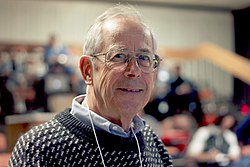Jim Peebles
| Phillip James Edwin Peebles | |
|---|---|
 |
|
| Born |
April 25, 1935 Winnipeg, Manitoba, Canada |
| Fields |
Theoretical physics Physical cosmology |
| Institutions | Princeton University |
| Alma mater |
University of Manitoba (BSc) Princeton University (PhD) |
| Known for | Cosmic microwave background radiation |
| Notable awards |
Eddington Medal (1981) Heineman Prize (1982) Bruce Medal (1995) Gold Medal of the Royal Astronomical Society (1998) Gruber Prize (2000) Harvey Prize (2001) Shaw Prize (2004) Crafoord Prize (2005) Dirac Medal (2013) |
Phillip James Edwin "Jim" Peebles (born April 25, 1935) is a Canadian-American physicist and theoretical cosmologist who is currently the Albert Einstein Professor Emeritus of Science at Princeton University. He is widely regarded as one of the world's leading theoretical cosmologists in the period since 1970, with major theoretical contributions to primordial nucleosynthesis, dark matter, the cosmic microwave background and structure formation. His three textbooks (Physical Cosmology, 1971; Large Scale Structure of the Universe, 1980; Principles of Physical Cosmology, 1993) have been standard references in the field.
Peebles was born in Winnipeg and completed his bachelor's degree at the University of Manitoba. He left Manitoba in the fall of 1958 to attend Princeton University, where he completed his doctorate supervised by Robert Dicke; he remained at Princeton for his whole career.
Peebles has made many important contributions to the big bang model. With Robert Dicke and others (nearly two decades after George Gamov, Ralph A. Alpher and Robert C. Herman), he predicted the cosmic microwave background radiation. Along with making major contributions to big bang nucleosynthesis, dark matter and dark energy, he was the leading pioneer in the theory of cosmic structure formation in the 1970s. Long before it was considered a serious, quantitative branch of physics, Peebles was studying physical cosmology and has done much to establish its respectability. His Shaw Prize citation states "He laid the foundations for almost all modern investigations in cosmology, both theoretical and observational, transforming a highly speculative field into a precision science."
...
Wikipedia
